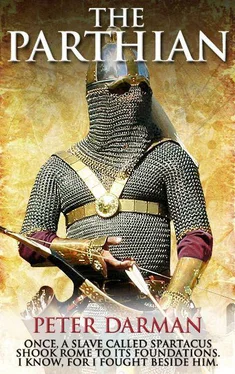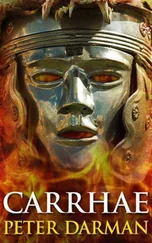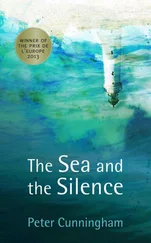Peter Darman - The Parthian
Здесь есть возможность читать онлайн «Peter Darman - The Parthian» весь текст электронной книги совершенно бесплатно (целиком полную версию без сокращений). В некоторых случаях можно слушать аудио, скачать через торрент в формате fb2 и присутствует краткое содержание. Год выпуска: 2011, Жанр: Исторические приключения, на английском языке. Описание произведения, (предисловие) а так же отзывы посетителей доступны на портале библиотеки ЛибКат.
- Название:The Parthian
- Автор:
- Жанр:
- Год:2011
- ISBN:нет данных
- Рейтинг книги:4 / 5. Голосов: 1
-
Избранное:Добавить в избранное
- Отзывы:
-
Ваша оценка:
- 80
- 1
- 2
- 3
- 4
- 5
The Parthian: краткое содержание, описание и аннотация
Предлагаем к чтению аннотацию, описание, краткое содержание или предисловие (зависит от того, что написал сам автор книги «The Parthian»). Если вы не нашли необходимую информацию о книге — напишите в комментариях, мы постараемся отыскать её.
The Parthian — читать онлайн бесплатно полную книгу (весь текст) целиком
Ниже представлен текст книги, разбитый по страницам. Система сохранения места последней прочитанной страницы, позволяет с удобством читать онлайн бесплатно книгу «The Parthian», без необходимости каждый раз заново искать на чём Вы остановились. Поставьте закладку, и сможете в любой момент перейти на страницу, на которой закончили чтение.
Интервал:
Закладка:
We began at a steady trot, covering thirteen feet a second. I reached into my quiver, pulled an arrow then placed its nock in the bowstring. I could see the Roman cavalry now, a great black mass growing larger by the second. Men in steel helmets and mail coats carrying long spears and green shields. Some carried standards of square pieces of cloth mounted atop a pole. In front of them rode a rider on a black horse, his red cloak fluttering behind him and his helmet crested with red. His outstretched right arm held a sword that was pointing directly at us. Furius himself.
We were nearing them; perhaps a mile now separated the two groups. I urged Remus to increase his speed and he moved into an easy gallop, his mighty hooves traversing nineteen feet of ground a second. I could hear the Romans cheering and see their spears levelled to ram their points through our bodies. I screamed and Remus increased his speed, charging at a full gallop of over thirty feet a second. If the Romans had reached us unbroken they would have hit us like a steel blade being rammed though a wicker shield, but once more they underestimated us and our tactics, for in their arrogant eyes we were but slaves fit only to be slaughtered.
They were already thinking of victory and glory when the first volley of arrows hit their mounts and riders, sending both crashing to the ground. We opened fire seven hundred paces from them and kept stringing and loosing arrows. In ten seconds each horse archer had fired at least three arrows. For the Romans it was like riding into a steel rain. Their front rank went down and their second crashed into the wounded and flaying horses in front of them, throwing many to the ground and causing others to rear up in panic. At once their charge disintegrated and then we were among them. I galloped past one rider and swung around in the saddle to shoot him in the back, then shot another rider who was bearing down on me with his long spear, the arrow piercing his chest and throwing him from his mount. We had broken the Roman formation as each of our companies kept its arrowhead formation, thirty of so riders in each of its three ranks. We charged straight through the Romans and out the other side, leaving the ground strewn with dead and dying men and horses. Horns blasted and we halted and turned. We had also suffered losses, many horses running around with empty saddles. I glanced to my left; Gallia was still with me.
We charged back into the Romans, this time not galloping but moved our mounts forward at a gentle trot. The Romans were disorganised and stationary, and so presented easy targets. We emptied our quivers, each rider firing up to seven arrows a minute. We didn’t fire wild, we made each arrow count, creating a swathe of death in front of us as we neared the enemy. Some Romans attempted to charge but died before they got close to us. The Romans were being slaughtered. As one rider ran out of arrows another behind him moved forward to take his place and began to shoot at a diminishing number of Roman cavalry. I heard a man shouting and screaming wildly and saw Lucius Furius riding up and down the line, frantically trying to restore some order. He failed. The surviving Romans broke and galloped away, this time north, in the direction of our camp. We charged after them.
I had no arrows left now, so I drew my sword and rode level to an enemy rider. His shield covered his left side so I swung my sword to strike the side of his helmet. He squealed like a stuck pig and toppled from his saddle. During the next half hour or so we methodically hunted down and killed most of the Roman horsemen, who had become nothing more than a host of desperate fugitives. Some were still dangerous, though, and one group of around fifty led by Furius turned and charged straight at me, killing a number of Gallia’s women before we surrounded and then fought them in a desperate melee. I reached Furius and tried to run him through, but he blocked my thrust with his shield and then swung his sword to try and decapitate me. I ducked and hacked at him, but again his shield saved him, though his horse became frightened and reared up in alarm. Furius fell from his saddle and sprawled on the ground. I jumped down from Remus as he staggered to his feet and I thrust the point of my spatha into his right shoulder. He screamed in pain and fell to his knees. I drew back the blade to send him to hell when I heard Gallia’s shout of ‘Pacorus’, and turned to see a Roman horseman bearing down on me with his spear aimed at my chest. Gallia shot his horse with an arrow and the beast collapsed to the earth, spilling its rider onto the ground. I stood over him, rammed my foot down on the base of his spine, grasped the handle of my spatha with both hands and then rammed it down as hard I could through his back. I nodded at Gallia and turned to see the wounded Furius being hauled onto a horse by one of his men, who rode away with my nemesis laid flat across his horse’s back. I ran to Remus but my quiver was empty. Lucius Furius lived again. How many lives did this man have?
I ordered recall to be sounded and over the next hour or so horsemen regrouped around my standard. We were now at least a mile south of where the battle was being fought on the other side of the river, and I was eager to get back to offer support. The news was not good. We had lost five hundred riders in the fighting with the Roman cavalry, though they must have lost perhaps three times that number. Gallia had lost forty of her women killed and now her company numbered a mere thirty riders. I sent them back to camp in case any Roman cavalry had found their way there, and told them to remain there until I returned. Then, as the sun began its descent into the western sky, we rode south again.
The battle had ended. Both sides were exhausted after hours of close-quarter fighting in which thousands had been killed. Among the dead was Castus, who had died while leading a desperate charge against a Roman assault that had threatened to split his line. His attack succeeded in driving back the Romans, but he himself was killed under a plethora of sword blows. Cannicus now led the Germans, what was left of them, but he himself was also wounded.
‘It’s not too bad, Pacorus,’ he said, holding his right side that was soaked in his blood.
‘I am sorry about Castus.’
‘He was a good man and my friend. But still, at least we beat the bastards.’ He grimaced and coughed, spitting blood onto the ground.
The Romans, what was left of them, were leaving the field now, crawling back to the safety of their camp, many of them limping and others being loaded onto stretchers. They left thousands of their comrades dead on the field. There would be no more fighting today.
I left Cannicus and rode over to the centre of the line where Akmon’s Thracians were located. I had to navigate Remus around mounds of dead Romans and Thracians; their corpses intermingled in a ghastly embrace of death. Most of the Thracians still alive were either sprawled on the ground or resting on their shields. They barely looked up as we rode past them. I found Akmon lying on the ground surrounded by his officers, one of whom was Domitus. His face was white and his eyes were closed. He had joined Spartacus. I knelt beside his lifeless body and bowed my head in respect.
‘You had better get your men back to camp,’ I said Domitus. ‘You lead the Thracians now.’
‘I will, sir, when they have the energy to walk.’
He looked numb, as though he had seen a vision of hell. Looking round, he probably had. How strange fate was. Here was a Roman leading the Thracian warriors of Spartacus, and I for one was glad for he was a brave and loyal soldier. We rode over to the right flank where Afranius and his Spaniards had fought. There were barely any of them left, while in front of them the ground was carpeted with dead Romans as far as the eye could see, Afranius himself stood alone among the dead, far in front of his still living troops. He sneered when he saw me.
Читать дальшеИнтервал:
Закладка:
Похожие книги на «The Parthian»
Представляем Вашему вниманию похожие книги на «The Parthian» списком для выбора. Мы отобрали схожую по названию и смыслу литературу в надежде предоставить читателям больше вариантов отыскать новые, интересные, ещё непрочитанные произведения.
Обсуждение, отзывы о книге «The Parthian» и просто собственные мнения читателей. Оставьте ваши комментарии, напишите, что Вы думаете о произведении, его смысле или главных героях. Укажите что конкретно понравилось, а что нет, и почему Вы так считаете.












